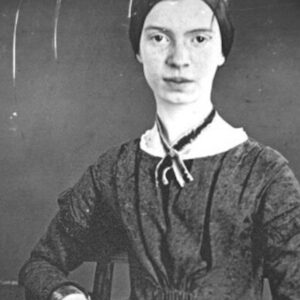In her recently published poem “To the Ram’s Horn I Cannot Sound,” Sharon Dolin writes,
The sound I imagine
you make has to
hold me and wake
me…
I, too, have a shofar, a ram’s horn, that I cannot sound. Well, sometimes I can get one rather tortured tekiah (one of four traditional sounds) out of it, but don’t choose me to blow shofar on demand as part of Rosh Hashanah and Yom Kippur services. The sound of the shofar is a call to engage in teshuvah, to return one’s life to God. It’s also a reminder of Abraham’s faith in God and the ram that was sacrificed instead of his beloved son Isaac. Jews read that Torah story on Rosh Hashanah.
Is imagined sound as impactful as actual sound? Does the imagination have enough power to awaken a process of deep moral and spiritual transformation?
In her poem “Flickering Mind,” published four decades before Dolin’s “To the Ram’s Horn,” Denise Levertov confesses her difficulty with being present to God. “Lord, not you, / it is I who am absent,” the poem begins. Through the process of attending closely to her experience of absence, she awakens her deep imagination. That’s when she arrives, fully present. Levertov’s poem continues:
I stop to think about you, and my mind at once like a minnow darts away
There it is, the problem: the human mind. Anyone who’s ever practiced meditation knows what happens when you try to direct your attention and sustain it on an object of concentration (breath, a phrase): the mind at once darts away.
What does the mind dart to?
[It] darts into the shadows, into gleams that fret unceasing over the river’s purling and passing.
The senses are present and alive: seeing, hearing. So, too, is the mind. It’s easily distracted:
Not for one second will my self hold still, but wanders anywhere, everywhere it can turn.
It’s also alive with ideas, one idea, at least:
You are the stream, the fish, the light, the pulsing shadow, you the unchanging presence, in whom all moves and changes.
Levertov knows that God is present in nature. But that knowledge alone isn’t enough to awaken her presence. Only the imagination—another way of knowing—can do that.
The poem concludes:
How can I focus my flickering, perceive at the fountain’s heart the sapphire I know is there?
She’s still aware of her discursive mind’s “flickering.” “Flickering” as in “unsteady,” “changeable.” But also as in “shining” or “illuminated by a wavering light”—the light of the imagination, the light that illuminates that quietly stunning image of “the sapphire” “at the fountain’s heart.” Contrary to what she asks—”how can I perceive it”—she does perceive it! She doesn’t simply “know” it’s there because she has read or heard about it. She knows the sapphire is there because she sees it. This is the moment, thanks to the work of the imagination, that she arrives, fully present—within and without—to God.
Is the imagination the way to God?
“The sound I imagine…has to…wake me,” writes Dolin. Yet, it’s the actual sound of jackhammers—”street drills”—that wake her in “Ram’s Horn.” Those drills are working on repairing the sidewalk outside her doorway where, for fourteen years, she’d stop before being led onward by her dog to a park with a tree where she says her morning prayers (“Modeh Ani,” thankful am I to You,” and “Sh’ma,” Hear, O Israel…). Because of that, she now calls street drills her “urban shofar.” They turn her attention to prayer, to God.
But through her meditation on the shofar—the “frustrated breath” she experiences when she tries to blow it, the unconventional shofar of daily urban life, its role in turning her, in the holy season, to God—she arrives at another purpose of the ritual horn: to awaken God to God’s need to return to us.
A river, a street drill: distractions that draw our attention away from God? What about random thoughts that come during prayer—about work, family, friends, money, politics, weather…? Do they come between us and God, preventing us from being present to and experiencing the presence of the Divine?
On Sefaria, “a living library of Torah,” I read that the Baal Shem Tov, the founder of Hasidic Judaism, “taught that if a foreign thought falls into your mind” during prayer, “consider that it, like everything, is constructed of letters and that the letters are holy.” I assume that the Baal Shem Tov had in mind thoughts in Hebrew. Still, I am happy to believe that there is value in applying the same teaching to thoughts that arise in English or Arabic or German or Spanish or any language. The teaching continues, “It is just that they [the foreign thoughts] were badly reconfigured in the mind and became idiocy. Therefore, if you can transform these letters into holy words, this would indeed be very good—whether by reading the words of the foreign thought backwards, or by splitting the words into two, or by reading the initials of the thought. But all this is only as long as you don’t interrupt your attunement in prayer.”
What a practice! What an invitation to use the imagination in the midst of prayer! Working with the actual materials of mundane experience, one can find holiness within them and bring oneself close to God. This practice seems like a powerful way to create not only “holy words” but poetry, art.
Is art the way to God?
Is art the way to bring God back to us?
In Dolin’s poem, the call of the shofar is as much to wake up God “in the t’shuvah dance of return” as it is to wake her up—the shofar prodding them both “to face one another: / bow and start encircling / each other again.”
If God is a foreign, alien, meaningless, offensive term or concept for you, think of this. How likely is it that you will be present, fully present, to the next being you encounter? How likely is it that that being will be fully present to you? Can the imagination, can art, help create the conditions in which we can be fully present to each other? Levertov and Dolin suggest they can.
Try this. Listen to me blow the shofar. I’m blowing it now.
What you just heard is probably more likely to draw you near to me, and me to you, than would happen if you were with me physically right now as I strain to make a tekiah.
Richard Chess directed the Center for Jewish Studies at UNC Asheville for 30 years. He helps lead UNC Asheville’s contemplative inquiry initiative. He is a board member for the Center for Contemplative Mind in Society. He’s published four books of poetry, the most recent of which is Love Nailed to the Doorpost. You can find him at http://www.richardchess.com





